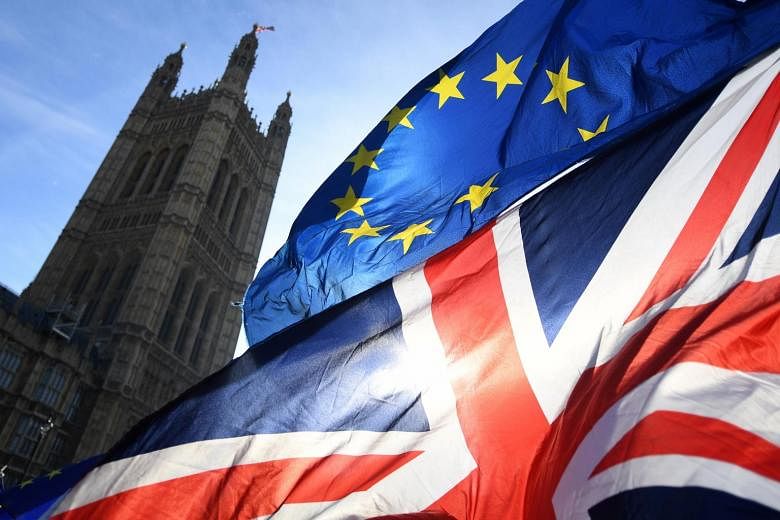SINGAPORE - Even if Britain leaves the European Union (EU) without a withdrawal agreement having been agreed upon, the Ministry of Trade and Industry's (MTI) assessment is that "trade between the UK and Singapore will not be fundamentally impaired", said Minister for Trade and Industry Chan Chun Sing in a written reply to a parliamentary question on Monday night (Feb 11).
Singapore is also prepared to work with Britain to apply the EU-Singapore Free Trade Agreement (EUSFTA) in a Britain-Singapore context that could form the basis of a future trade agreement between both countries, he added.
He was replying to Tampines GRC MP Desmond Choo, who had asked how Singapore would be hit by a no-deal Brexit, and how Brexit would affect the ratification and implementation of the EUSFTA.
The ratification of the EUSFTA and EU-Singapore Investment Protection Agreement is on track and is not affected by Brexit, with both pacts expected to be voted on by the European Parliament during its next sitting from Feb 11 to 14, 2019, said Mr Chan.
"Pending clarity on post-Brexit arrangements, any consequential amendments to the EUSFTA can be addressed during the implementation phase."
Mr Chan noted that Britain is the second largest economy in the EU and the fifth largest globally, as well as an important economic partner of Singapore. "Like other countries, we are keeping a close watch on Brexit, which remains set for March 29, 2019," he said.
He gave a rundown of three possible scenarios.
Under the first, in which Britain and the EU agree on a withdrawal agreement, the said agreement will include an implementation period lasting until Dec 31, 2020. During this period, Britain will continue to be functionally treated as an EU member state and remain a party to the EU's international agreements, including the EUSFTA when ratified by the European Parliament as is the target for 2019.
"This scenario offers the greatest predictability and stability while minimising disruption to businesses," said Mr Chan.
Under the second "hard Brexit" or no-deal scenario, Britain will cease to be a party to the EU's agreements with third countries when it formally leaves the EU on March 29.
This would mean that the EUSFTA will not apply between Britain and Singapore, said Mr Chan, but he added: "This in itself would not impact our trading relationship with the UK as the current tariff and non-tariff regime for Singapore companies trading with the UK are based on WTO (World Trade Organisation) terms, which would continue to apply."
A third scenario is that Britain's formal departure from the EU is postponed beyond March 29. In this case, the prospect of an imminent no-deal Brexit would be diminished, though there may be a period of continued uncertainty, said Mr Chan.
Noting the substantial trade and investment linkages between Singapore and Britain, with many businesses operating in the other's markets across sectors such as pharmaceuticals, professional services and consumer goods, Mr Chan said: "MTI's assessment is that trade between the UK and Singapore will not be fundamentally impaired."
But he acknowledged: "Nonetheless, owing to the integrated nature of today's global supply chains as well as the extensive trade linkages that spans the UK, EU and the rest of the world, a no-deal Brexit could weigh on consumer and business sentiments in the UK and EU, with potential negative effects on global growth."
The MTI and Enterprise Singapore will continue to work closely with Singapore companies to help with any near-term company-specific disruption, said Mr Chan. This includes helping companies link up with the appropriate authorities to work through continuity issues in areas such as labour and talent supply, or delays in shipments that might be routed between Britain and the EU.
The MTI is also in close contact with British economic agencies on measures to further strengthen both countries' strong trade and investment relations.

